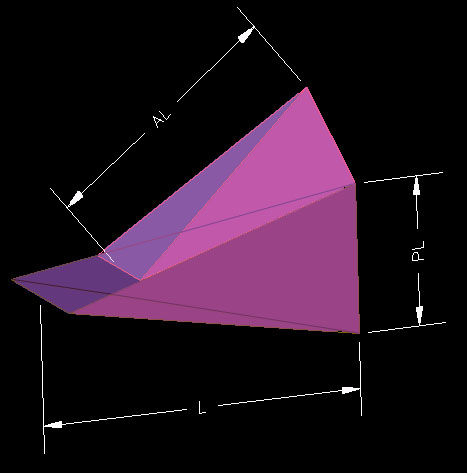
|
The illustration shows the parameters used by the applet to define and iterate a
tetrahedron.
Iterations are generated outward from each of the four faces of the base tetrahedron, resulting in a sculpture of 4-fold symmetry. |
| Karen Marcelo: Projects: Tetrahedonism: About |

|
The illustration shows the parameters used by the applet to define and iterate a
tetrahedron.
Iterations are generated outward from each of the four faces of the base tetrahedron, resulting in a sculpture of 4-fold symmetry. |
The TetraHedonism applet is written in Java using the VRML External Authoring Interface.
It interacts with the Browser to receive the parameters entered by the user, calculate the
resulting sculpture, and generate VRML 2.0 code on the fly, directly manipulating the .wrl's scene graph.
TetraHedonism uses computer graphics as a creative medium per se. That is, the calculation power of the computer is used to generate the geometry and complexity of the scene, not just to imitate "reality" by byte-intensive representation. Also, because it's a java applet, there is no transfer between server and client machines after the initial load - exploring the variety of worlds that can be generated with different sets of parameters doesn't hog bandwidth.
-Frank Revi
At the VRML Excellence Awards, this got an award...
This was demo'd at the Earth2Avatars conference last October. These are some reviews and coverage on TetraHedonism online at: VRMLSite (scroll way down) and at inquiry.com's VRML Gallery (scroll down).
Frank Revi, inspired by Buckminster Fuller came up with the idea of recursively iterating a tetrahedron for the demo. Frank did the math and ititial static models using AutoCad and 3DStudioMax. I converted it to VRML2 and added more nodes, wrote a Java applet using the External Authoring Interface to change the scene based on dimensions and iterations specified.
Here are images of what you might see depending on the tetrahedron parameters and number of iterations you specify.

|

|

|

|

|

|
What you will need to see this (as of 1/97):
Once you have all that, check out TetraHedonism for real. This is the beta version -still working on a different algorithm and maybe other features...